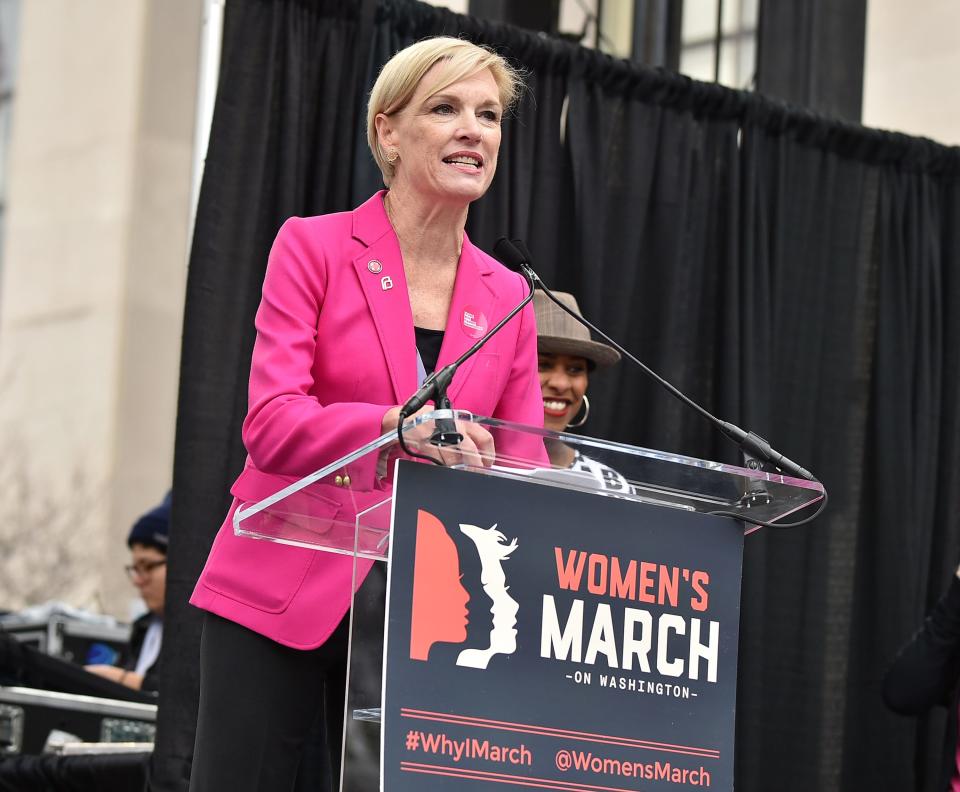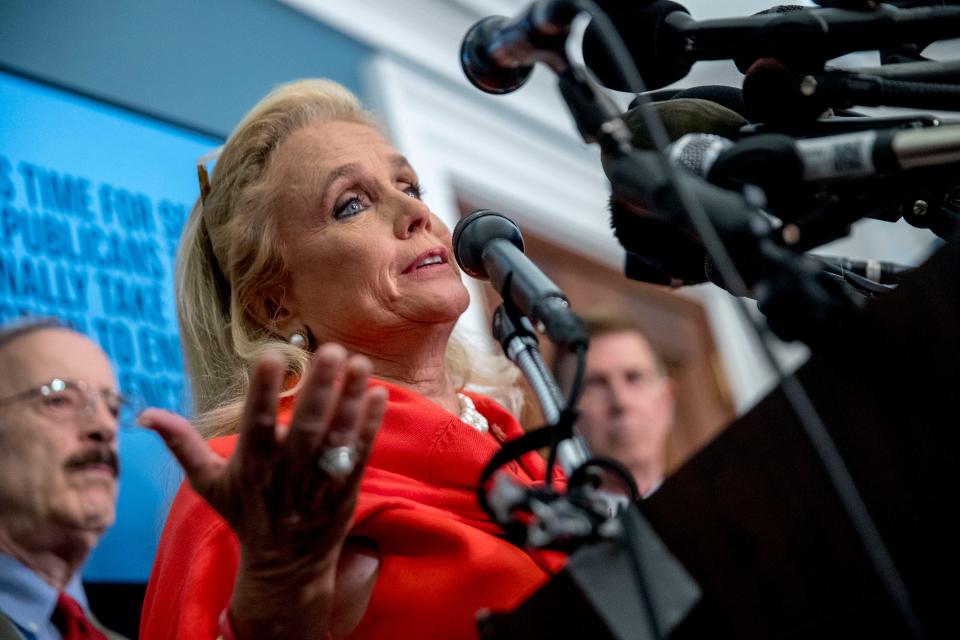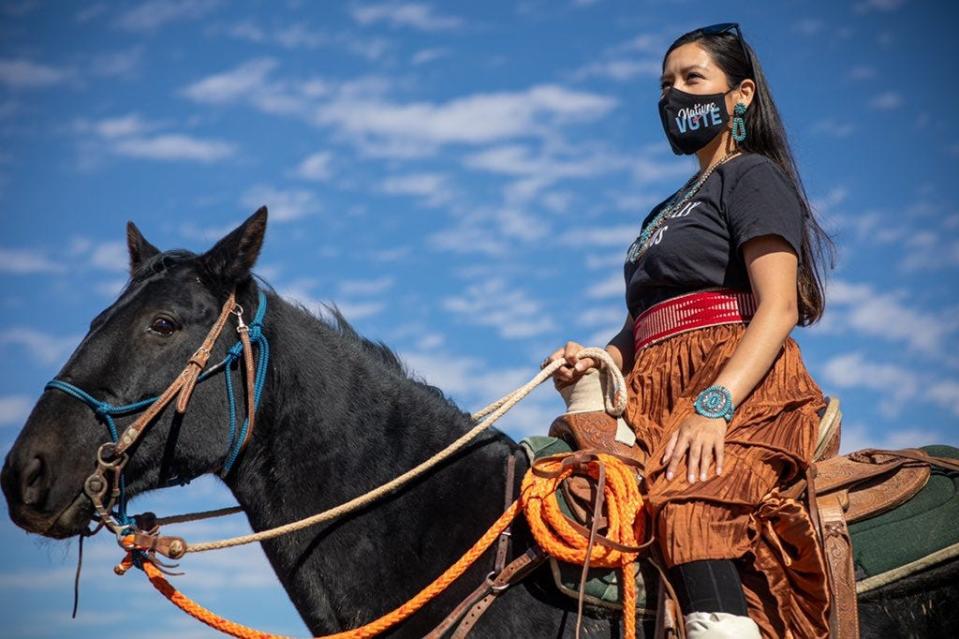After bruising setbacks, can Democrats convince women to show up to the polls during the midterms?
- Oops!Something went wrong.Please try again later.
Retired Virginia special educator Tina Clay says she will vote for Democrats in November. She's even text-campaigning for Beto O'Rourke's run for Texas governor. But Clay said some women she knows may not vote at all.
"There's always the busy young mother who just doesn't have time to get to the polls or someone else's husband is very conservative so she just votes as he votes," said Clay.
A resident of Loudoun County, Clay lives in Democratic Rep. Jennifer Wexton's district. However, because of redistricting Clay isn't sure if she'll be able to vote for Wexton.
Meanwhile, the National Republican Congressional Committee added Wexton to a list of 70 vulnerable members they are hoping to oust in Novembers.
The battle for Wexton's seat – and many others – underscores the uphill battle Democrats face to retain control of Congress in the upcoming midterm elections. To do that, they'll need women like Clay and her friends and acquaintances, even as the party finds itself struggling to boost those voters' enthusiasm.
It's been a difficult political climate for Democrats on a number of fronts: an inability to pass voting rights legislation or the Build Back Better Act, a still-raging coronavirus pandemic, the possibility of the Supreme Court rolling back abortion access this spring and high disapproval numbers for President Joe Biden.
"I am hoping that we will pull together groups of women, women of color, working-class women, teachers and nurses ... everyone has enough crossover, in terms of what their concerns are, that we'll come together," Clay said.
Congressional Democratic leaders are touting passage of the American Rescue Plan and the bipartisan infrastructure law across the nation. But political experts and advocates told USA TODAY more is still needed to improve the lives of American women and their families.
"President Biden, Vice President (Kamala) Harris, and Democrats in Congress have spent the last year delivering tax cuts for middle-class families, funding to safely open schools and get kids back in the classroom, and relief for small businesses across the country," Gabriela Cristobal, the Democratic National Committee's women's coalition director, said in a statement to USA TODAY.
"While we are confident that that strong record will resonate with women voters in November, Republicans will be forced to run on their party’s efforts to enact strict anti-abortion laws and their record of voting against lowering costs for Americans."
Pennsylvania, Arizona, Alabama: The Senate primary races to watch in 2022

How the pandemic is disrupting women's lives and Biden’s poll numbers
The nationwide exhaustion with the ongoing pandemic and rising inflation rates have dragged down the public’s approval of Biden.
A Reuters/Ipsos poll showed Biden's net approval ratings in the negative among all voters, including women, 44% of whom approve of him compared to 48% who disapprove.
Focus group surveys in Georgia, Texas and Michigan conducted by Navigator Research, a Democratic-aligned polling group, on Jan. 25 found that Black Americans' support for Biden declined 10 percentage points, from 86% to 76%, in 2021. For Black women between the ages 18-39 surveyed in Texas, 40% said they strongly approve of Biden and 36% said they somewhat approve of Biden.
A Morning Consult poll released in October found that Biden's approval rating among Black women Democrats was down to 41%, down 30 points since he moved into the White House. That same poll found 42% of Democratic women approved of Biden compared with 50% of Democratic men.
Biden’s poll numbers are just one signal that Democrats could face bruising midterm elections among women voters.
As the pandemic continues, many women of color and their families are bearing the brunt of its effects – whether it's high COVID-19 infection and death rates, paying higher prices for everyday items, or higher unemployment rates.
“For Latinas as a whole, my sisters are hurting because many of them were and are essential workers and they didn't have the luxury of staying at home,” said Maria Teresa Kumar, president and CEO of the voting rights group Voto Latino. “And it's trying to figure out how do you as a government, how do you connect with those people that feel like they're drowning, not just financially, but maybe for the first time in a way that impacts their mental health?”
Hispanic women faced the steepest initial job losses during the pandemic among major demographic groups, according to the U.S. Department of Labor. From March 2020 to March 2021, the number of Latinas in the work force dropped 2.74%, the biggest drop of any group, according to UCLA's Latino Policy and Politics Initiative.
Democrats have instead championed the infrastructure law to appeal to voters, arguing that the economy is rebounding under Biden’s leadership.
“In one year, growth is up, wages are up, unemployment is down. And this is just the beginning. The infrastructure law is going to result in millions of more good-paying jobs,” said Rep. Ted Lieu, D-Calif., at a recent news conference.
“People don't know what we've done, and we are making sure that they know,” said Rep. Debbie Dingell, D-Mich.
However, there were more than 1 million fewer women in the labor force in January 2022 than in February 2020, according to the National Women's Law Center.
Notably, the child care sector has lost nearly 1 in 8 jobs since the pandemic began, a factor that contributes to the difficulty for women reentering the workface.

Democratic super PAC American Bridge 21st Century launched a $100 million media campaign in support of Biden and his policy wins in crucial battleground states in March 2021. The organization has created ads with influencers, including "Bachelorette" contestants, in order to reach women in Georgia, Arizona and Pennsylvania who are not closely following politics.
In one ad, three former "Bachelorette" contestants – Mike Johnson, Matt Donald and Luke Stone – praise the Biden administration's success supporting American families through the American Rescue Plan and the bipartisan infrastructure law.
“It's much more (than) hoping that women will get to political news, but trying to bring it to them in mediums and with spokespeople that they trust already,” said Cecile Richards, co-chair of American Bridge 21st Century. “Women care about these issues. It's not that they don't care. It's just very hard in the news clutter right now for them to actually understand ‘oh, this thing happened. And this is how it could impact my family.'’’
More than half of Vote.org’s users are women, according to the organization's CEO, Andrea Hailey. Along with influencers, the group also partnered with Fresh EBT, an app that allows low-income Americans to monitor their food stamp benefits, to register voters.
"Fresh EBT served over 3 million people, a large percentage of their user base are women," said Hailey. "And that generated over 300,000 people coming to Vote.org."
The partnership led to 50,000 new voter registrations, with 79% of the registrants being women.
More: Election workers faced new threats after 2020 election. Experts fear it will drive them away
Focusing on care and families key to appealing to women
Democratic pollster Brad Bannon cautions Democrats against solely focusing on the infrastructure law.
“I think it's important for the president and congressional Democrats to demonstrate the fact that they want to go further than that,” he said. “They want to expand Medicare benefits. They want to keep the childcare benefits. They want to push for health care benefits in general.”
Biden's new Build Back Better strategy: 5 takeaways from his long (and feisty) press conference
For example, expanded Child Tax Credit payments, which were part of the American Rescue Plan, helped low-income families who struggled in 2021. The failure of Congress to pass the Build Back Better Act means the monthly payments are now stalled.
House Appropriations Committee Chair Rep. Rosa DeLauro, D-Conn., said at a recent news conference, "The Child Tax Credit, in a shortest period of time, has demonstrated its success. It should not be left behind. It should be at the center of whatever we are doing in terms of a reconciliation package in the future."
States making it harder for people to cast their ballots
Senate Democrats’ unsuccessful efforts to pass a federal elections law last year or this means that several state-level laws that restrict voting will remain in place during the midterms.
Hailey, of Vote.org, called the failure of the voting rights bill a “big disappointment.”
“Our message now has been to voters, the most important thing that people can do is show up in the midterm elections, in support of democracy,” Hailey said.
More: Democrats came up short on MLK day promise. What's next for the push for a voting rights bill?
Passing an elections bill was a key priority for many Black and brown civic engagement groups, often led by women of color.
Using funding from American Bridge 21st Century's Bridge Together initiative, 1000 Women Strong, a Black women’s civic engagement group, will be organizing in Pennsylvania, Virginia, North Carolina, Georgia, Florida, Michigan and Texas ahead of the midterms.
Shakya Cherry-Donaldson, founder and executive director of 1000 Women Strong, said the lack of federal voting rights legislation will not stop Black women’s organizing ahead of the midterms.
“Are these last two years what we want? No,” Cherry-Donaldson said. “But does that mean we give up or we then disengage entirely from a system that we know is bigger than us? No, we don’t.”

Allie Young, founder of the Indigenous grassroots organization Protect the Sacred, was one of the Native leaders who met with Vice President Harris last summer to discuss Native American access to the ballot.
More: Senate Democrats fail to advance voting rights legislation and changes to filibuster
Young led a “Ride to the Polls” program, an initiative where Native voters rode on horseback to cast their ballots in Arizona during the 2020 election, and is now working on a “Ride to the Polls 2.0” during this year’s midterms.

"Ride to the Polls 2.0 is really focused on the Native community, Native women and on a national level as well," Young said. "We're taking our initiatives from 2020 and expanding it to other communities and tapping into that cultural foundation."
For Indigenous people who live on reservations, it can be cumbersome to find accessible polling places or post offices. Same-day voter registration would make it easier for Native people who are able to make it to the polls to vote, Young said.
Reproductive rights: a wild card
The Supreme Court’s decision later this year on abortion rights could galvanize Democratic women if the high court guts Roe v. Wade. The high court is weighing a 15-week abortion ban in Mississippi.
More than half of all states in the U.S. may ban abortion in some form depending on what happens as a result.
“I think the campaigns need to understand that they can't assume that women of color are going to come out, certainly not come out in the numbers that they need to win, without being champions for the issues that matter to us,” said Aimee Allison, founder of the women of color advocacy group She the People.

Haleema Bharoocha, youth advocate and social impact consultant and a 2021 She the People 25 under 25 women of color to watch awardee, said Democratic leaders are not meeting the needs of Gen-Z women of color.
“We're looking at the possibility of Roe v. Wade being gutted. And that is under a Democratic administration. So things have not been better,” Bharoocha said.
Bharoocha said Democrats don’t have a long-term strategy for culturally responsive civic engagement.
In Muslim communities, “we don't have people in our community or even the resources to do large-scale education and awareness that is culturally responsive, that helps our community to understand this issue better,” Bharoocha said.
Karin Stanford, a political science professor at California State University, Northridge, said Biden has not done enough work to improve the lives of Black women voters in particular, whether it means securing reproductive rights or supporting other issues such as student loan debt. Black women are a cornerstone of the Democratic Party, among the most loyal voters to cast their ballots for Democrats.
“We're looking for substantive public policy that will impact us or address those bread-and-butter issues in our community, and he (Biden) really has not done that,” Stanford said.
When it comes to reproductive rights, Stanford said Biden could act now irrespective of what the Supreme Court rules.
“The issue of reproductive rights goes beyond (abortion). Black women have the highest rates of infant mortality around the country,” Stanford said. “And I'm thinking what can the federal government do? Block grants to states ... reproductive health facilities or at least facilities that will support women during pregnancy.”
In Atlanta, Shaun Davis is one of those female voters discouraged by some of the actions Biden and Democrats have taken over the past year.
"I don't feel like the Democrats are doing enough to take action. We worked so hard here in Georgia to get Raphael Warnock and Jon Ossoff elected (to the Senate) and that changed the shape of Congress," said Davis, a managing editor at Found, a weight care company.
She's voting for the Democrats anyway, she said, but that's more about her disagreements with Republicans than an embrace of the Democratic Party.
“I felt like they (Democrats) should have done everything they could to preserve voting rights. And I feel like the effort has been really lame and just kind of like, ‘oh, well, we tried,'" she said. "That's just enraging to me."
This article originally appeared on USA TODAY: Midterms: Democrats struggle to attract key female voters

